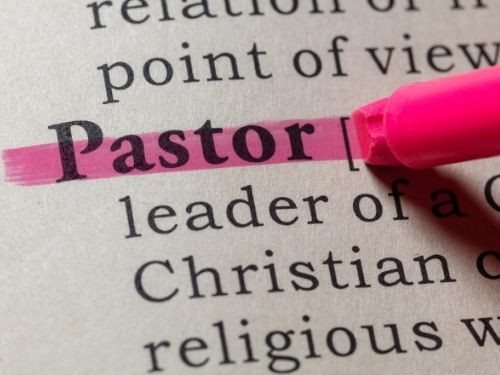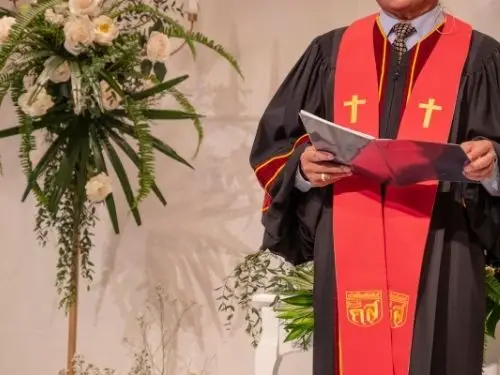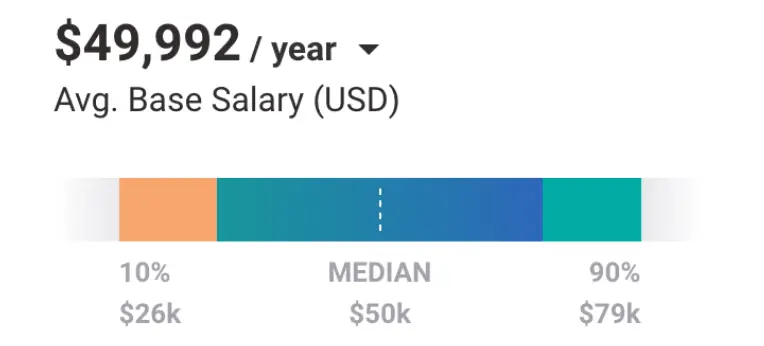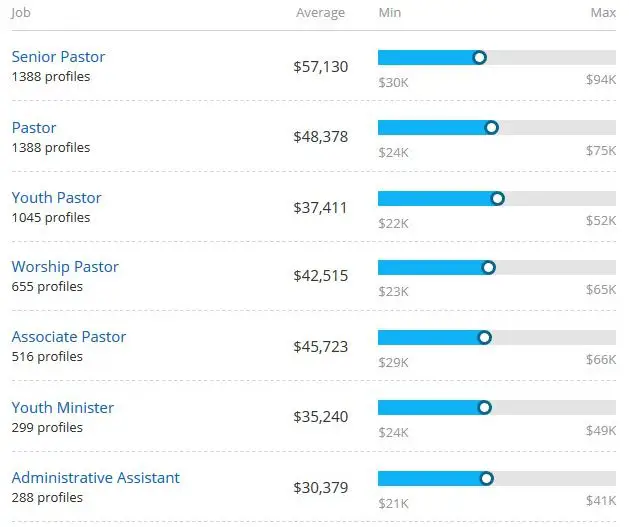How to Become a Pastor: Everything to Know in 2022
Feeling the call to serve God’s house? Here’s a complete guide on how to become a pastor with everything you’d ever need to know this 2022.
A pastor is a Christian, spiritual leader of a group of people or congregation. A pastor furthers the work of the church while leading others into a growing relationship with Jesus Christ. As a pastor, you can practice within a specific concentration, such as working with children, overseeing a ministry, or serving as a senior pastor. Pastors must follow the particular demands that their church requires, including requirements of character, experience, and education.
Pastors can be full-time, part-time, bi-vocational, or volunteer. This guide goes over everything you need to know when it comes to how to become a pastor.
What does a Pastor do ?
You might think a pastor is a man who delivers a sermon at your weekly mass. In reality, pastors do much more than that. A pastor is expected to provide more than spiritual leadership.
Here are some of a pastor’s additional duties:
- Oversee church committees, missions, and missionaries
- Perform baptisms, weddings, and funerals
- Provide marital, grief, and psychological counseling
- Plan community outreach activities
- Conduct or arrange for Sunday school classes
- Conduct or arrange for adult religious instruction
- Seek out new members for the congregation
- Be available evenings and weekends as needed
- Collaborate with the choir to integrate music into church services
- Complete administrative duties
- Attend social functions at the church
- Assist in church financial matters
- Oversee management of all areas of the congregation's ministry
- Support, oversee and evaluate congregation staff
- Hold regular staff meetings to coordinate ministries
- Ensure church facilities are functioning
- Give full support biblically to the Undesignated Budget of the church
- Adhere to the church bylaws and policies and procedures adopted by the church.
- Maintain a vital and wholesome personal relationship with the Lord through daily Bible study and prayer
Pastor or Preacher: What’s The Difference?
One might assume a pastor and preacher have the same duties. So, you might be wondering how to become a preacher in the same breath as how to become a pastor. However, the two aren’t the same. If you’re wondering how to become a preacher, you’ll learn that it’s much easier than becoming a pastor. In becoming a preacher, your primary responsibility is to spread the word of God through teachings, sermons, and conversations.
Preachers don’t have the requirement of overseeing the financial, administrative, or operational affairs of a congregation, while pastors do. Preachers aren’t required to counsel their congregation in matters of mental distress, grief, marriage, etc. Although they can if they wish, it’s not needed. Pastors, on the other hand, are expected to perform consular duties.
Requirements for Becoming a Pastor
Not everyone requires a traditional degree to become a pastor. While in consideration for a position, churches look for your knowledge and experience of the Bible, theology, and ministry. However, a seminary degree like the Master of divinity gives you the necessary credentials and education on the overall aspects the church looks for. Let's look at this in detail here.
Bachelor’s degree
A bachelor’s degree to become a pastor is a four-year program that offers 120-128 credits to complete the coursework, including Bible studies, mission and message of Jesus, theology, Christian ministry, ethics, sociology, and topics to cover old new testaments.
Master of Divinity (M.Div.)
Aspiring students choose this degree program to advance their knowledge to become a pastor. This program is accredited by the renowned accrediting agency called the Association of Theological Schools(ATS. Usually, it takes up to 3-4 years as it requires the completion of a minimum of 72 credit hours. The courses include theology, biblical studies, biblical languages, pastoral care, church history, and liturgics.
Some programs also allow students to gain education and practice and observe the skills of an ordained pastor.
How Much Does it Cost to Become a Pastor?
Sometimes, you may find that having a degree is simply a plus and not a requirement for becoming a pastor. Churches want people who are passionate about the Bible, ministry, and theology. If potential hires know enough about those things, then that knowledge does not necessarily have to come from formal education. There may not be too much cost involved in the process in such a case.
In an ideal world, you can become a pastor without going into crazy amounts of debt. Unfortunately, in most cases, you will need to have an education.
Many churches require you to have a master’s degree in divinity, theology, or related fields to qualify for a pastor position. This requirement means you’ll also need to have a bachelor’s degree. Your bachelor’s degree doesn't necessarily have to be in a theology-related field, although it is recommended.
Earning your bachelor’s degree in theology online can run you anywhere from $42,000 to $70,000 in tuition fees alone. This estimate does not include any additional fees or costs incurred during your studies.
When it comes to earning your master’s degree, you may find that the total costs may run between $35,000 and $50,000 — or more. For example, at Trinity Lutheran Seminary, one credit hour for the Master of Divinity program costs $656. For the entire four years, tuition alone will cost you more than $55,000. You may also have to contend with yearly fees and living costs. Some seminaries can cost much more.
All in all, with the cost of a bachelor’s degree and a master’s degree, you could be spending well over a thousand on your way to becoming a preacher. So how do you become a pastor when the education you need can put you in lifelong debt?
Thankfully, many seminaries may offer financial aid to help you along. Always check with the seminary to see whether you can secure scholarships or grants to help reduce the financial burden. There may also be some discounts for special cases.
How Long Does it Take to Become a Pastor?
Ordination requirements may vary depending on the denomination and the individual church. This variance in requirements means it may take longer to become a pastor at one church than another. Generally, however, you would have to count the length of time it takes to complete a bachelor’s degree, a Master’s in Divinity, and two to three years of the church candidacy process.
Steps for becoming a Pastor
1
Be Dedicated.
People perform best when they’re passionate. While this is true for many occupations, it’s especially true for pastors. Becoming a pastor means that you have absolute confidence in your faith and are ready to share it. Becoming a pastor can be a lengthy and strenuous process.
Additionally, faith isn’t enough to succeed as a pastor. You need to have the dedication and drive required to be a leader to your congregation. Many pastors also need to move often, so you must be dedicated to handle the stress that comes with relocating.
It’s essential to seek spiritual guidance before making your decision. Make sure that you have chosen the right path and dedicate yourself wholeheartedly.

2
Earn A Bachelor's Degree
Specific educational requirements for becoming a pastor vary amongst denominations and churches. Many require both a bachelor’s and master’s degree, though some churches are satisfied with just a bachelor’s degree.
Either way, a pastor schooling begins with a 4-year bachelor’s degree. Your bachelor’s degree should specialize in either:
- Theology
- Religious studies
- Liberal Arts
- Divinity
While you study, you should also be active in campus ministry. Colleges and universities may feature a campus ministry where students can worship and express their faith. Leading Bible study groups or volunteering within the community may be beneficial both spiritually and for admission into graduate programs. Pastor education requirements emphasize education, training, and skills necessary for the profession.

3
Gain Experience
Pastors may begin their career as associate pastors. They'll work under the supervision of a senior pastor at the church. While associate pastors may lead spiritual groups and be available for counseling during the week, they may conduct readings during services and perform sermons periodically.

4
Complete A Master's Degree
After the completion of a bachelor's degree, pastoral students typically begin their graduate coursework at a seminary or School of Divinity. A common master’s program for prospective pastors is the Master of Divinity (M. Div.).
While all pastors study the Christian faith, additional courses based on the denomination of study may be offered. Most seminaries offer an apprenticeship-like program included in the master's program that allows pastoral students to observe and practice their developing skills with an ordained pastor.

5
Look For Senior Pastor Opportunities
Depending on pastors' goals or the needs of a denomination, pastors may spend only a short time serving one congregation, or serve one for many years. Typically, pastors are notified of job openings through postings from the denominational governing organization. These days, however, you can even find pastor job openings on common employment websites like Indeed.

Pastor Degree Levels
Bachelors
Popular undergraduate majors for students who wish to pursue a career in religious leadership include Bible or pastoral studies, theology, and ministry. Some programs offer bachelor's degrees in specific ministerial areas, such as pastoral studies. Courses in the program cover topics in the Old and New Testament, theology, ethics, pastoral studies, and sociology.
Theology
-
The Nature and Method of Theology
-
The Foundation of Theology
-
Scripture
Objectives
-
Articulate and defend the essential theological doctrines
-
Compare and contrast the Christian worldview
-
Integrate theological doctrines with contemporary issues
Christian Ministry
-
A Definition of Spiritual Leadership
-
Licensing & Ordination
-
The Spiritual Disciplines
Objectives
-
Construct a personal philosophy for ministry
-
Articulate a basic understanding of the nature of ministry
-
Integrate biblical and philosophical foundations with the practices of ministry
Mission and message of jesus
-
Jesus (and the Gospels)
-
Mark’s Story of Jesus
-
Jerusalem and Rome
Objectives
-
Read biblical texts closely and critically
-
Identify the distinctive literary and theological themes
-
Comprehend the aims and strategies of Jesus’ renewal movement
Masters
Aspiring pastors may follow a degree plan for a Master of Divinity (M.Div.). The M.Div is an academic, professional degree that combines the study of a number of disciplines important for a pastor to learn. The M.Div. degree program typically lasts 2 to 3 years, depending on the number of courses taken each semester. Courses are strictly focused on religious practices, Bible study, and congregational leadership.
Biblical studies
-
Introduction to the Greek Language
-
Introduction to the Canon of Scripture
-
Introduction to the Hebrew Language
Objectives
-
Locate key terms necessary for biblical studies
-
Identify and define facts about the revelation of the Scriptures
-
Learn some basic facts about Greek grammar
Biblical languages
-
Intro to Koine Greek
-
The Greek Verb and Participle
-
Intro to Hebrew
Objectives
-
To recount a basic history of Classical Hebrew and Koine Greek
-
To recognize and pronounce biblical Hebrew and Greek words
-
A basic knowledge of English grammar as preparation for understanding biblical Greek and Hebrew
Pastoral care
-
Integration Model for Counseling
-
Pastor as Minor Poet
-
Strategic Pastoral Counseling Resources
Objectives
-
Learn general counseling principles
-
Practice basic counseling skills
-
Explore personal life issues that may influence counselor effectiveness
Do Pastors Need a License to Operate?
If all you want to do is become a minister so you can officiate weddings, you can get your license to wed once you pay the fee. There is little to no training involved — getting this license is easy.
If you want to be a pastor to lead a congregation, the situation is different.
As a pastor, you do need to be ordained. Many churches of various denominations are affiliated with a credentialing organization or may also offer the licensing themselves. It is best to inquire with specific churches to find out their requirements and policies so you can start the application process.
You may also obtain a license through a federal or state government body. Still, unfortunately, these licenses do not often carry that much weight when it comes to finding a pastoral position. It’s worth noting that some states do require ministers to be state-licensed to officiate weddings. Some counties may also require you to be registered with the county’s clerk.
Other requirements you may run into include:
- A background check
- Psychological assessments
- A lifestyle questionnaire
- A licensing fee
Remember that some congregations may require you to renew your license either yearly or once every few years.
Related: Top 20 Religiously Affiliated Colleges
How Much do Pastors Earn?

Average pastor salary in the US (Indeed.com)
According to Indeed.com, the average base salary for pastors in the United States is $45,738. This figure was taken from 470 reported wages as of May 13, 2022. The reported salaries also make mention of health insurance and paid time off as benefits.

Median pastor salary in the US (PayScale.com)
According to PayScale, a pastor’s median salary is $49,992, from 2,561 salaries on April 27, 2022. A median salary is at dead center, with half of the pastors earning more than the median and half earning less.
Although these figures peg a pastor’s salary at almost fifty thousand a year, ministers’ salaries can vary greatly depending on factors such as the church’s geographic location, the congregation, the duties, and job title. However, despite the varying pay rates, congregations often cover housing or lodging for the pastor and their family. If no residence is provided, the congregation may often give a housing allowance.
Generally, pastors earn money from a yearly salary given by the congregation. However, some low-income congregations may struggle to pay their pastors much, if at all. In this case, the pastor may work part or full-time to support themselves. Pastors can also have “side hustles,” where they earn a portion of the fees paid to the church for weddings, funerals, and the like.
How to Become a Pastor: Tips That May Help
If you find yourself wondering how to be a pastor, these tips may help you along your path to answering your calling.
Commit to a Church and Serve
Before you even begin the process of becoming a pastor, you might want to find a church. Commit to it and start serving. It may be a basic step that is easy to gloss over, but it’s crucial to do. Getting hands-on experience of serving in a church can help you solidify your desire to answer the divine calling. Skipping this step can lead you into troublesome situations where you might feel indecisive or even jaded by the thought of becoming a preacher.
A pastor’s main task is to shepherd a congregation. The sooner you begin to serve in a church, experiencing it in all its beauty and inevitable imperfection, the more prepared you will be for becoming a pastor.
You don’t necessarily have to hold a prominent role at the church. Serving can mean even a more minor, behind-the-scenes role.
Read the Bible from Cover to Cover
If you haven’t already done it, it may seem like somewhat of a daunting task to read the bible in its entirety. However, as a future pastor, it is imperative to read through the bible and know every lesson within. When you read the bible entirely, you may be able to learn how important context is when it comes to interpreting the holy Scripture. You may also start developing a deep appreciation and passion for the Scripture, which is essential considering Scripture will be a massive part of your life as a pastor.
There’s no doubt that deep knowledge of the bible is necessary if you want to lead a congregation. Bible literacy makes it easier for you to share this passion with others and help them using the Scripture.
Listen for God’s Push Toward Ministry
You might be so wrapped up in asking, “how do I become a pastor?” that you forget to ask — “should I become a pastor?”
Those interested in becoming a pastor often start the process because they feel the calling. If they do not immediately feel this calling, they may at least feel a strong pull or passion toward pastoral leadership. If you are unsure, it may be a good idea to take some time to pray, reflect and listen for God’s push toward ministry. It doesn’t have to be an overt push or a tangible sign. It could be something as simple as a feeling in your gut that tells you to continue.
Praying and listening for this push can help you better figure out how you should serve in the Lord’s house.
Seek Guidance
It may benefit you to seek guidance from your church’s pastor or ministry members. You can ask them how to become a preacher and find out their particular experience with the process. Doing so can help guide you along the path you are on. You can also ask about their experiences as a church leader.
Speaking with your pastor can help you learn more about becoming one and being one. This knowledge can, in turn, help you make up your mind about becoming a pastor. It can also help prepare you for the future by arming you with some knowledge of what to expect, so you are not going in completely blind.
Frequently Asked Questions
What qualifications do you need to be pastor?
How does one become a pastor, exactly? What are the qualifications? Many churches will seek a pastor with a bachelor’s degree and a master’s degree in Divinity or a related field. On rare occasions, some churches may accept any formal education in Bible studies, pastoral studies, ministry, or theology. There may also be some soft skills necessary for this position, such as communication skills, leadership skills, empathy, and more.
How do I start to become a pastor?
Pray, reflect, and take time to decide whether you feel the calling to serve. Seek guidance and advice from your church leadership and sign up for more responsibilities at your church to give you a taste of how it is to serve. Start looking into fulfilling the educational requirements for becoming a pastor. Once you complete your education, work toward getting ordained and completing the candidacy process for a church.
Can you be a pastor without a degree?
In very rare cases, yes. Unfortunately, most churches look for the right educational qualifications, such as a seminary degree. Ultimately, individual churches can choose whether to ordain you and if you meet their standards, there is a slim chance you can get by without a degree.
How do you pastors get paid?
Pastors get paid an annual salary by their congregation, which may often include housing benefits. In situations where the congregation cannot afford to pay their pastor a yearly wage, pastors may have to work part or full-time jobs to support themselves and their families. They may also have “side hustles” such as officiating weddings and conducting funerals.
Do all pastors go to seminary?
Not necessarily. There have been many cases in history where pastors and church leadership received their positions without a seminary education. However, many churches prefer pastors who have indeed gone to seminary as it is a more objective way to determine knowledge and qualifications. Seminaries are also usually where necessary training is conducted, especially since many master’s degree programs have curriculums that are adapted to modern times.
How many years does it take to become a pastor?
This is a common follow-up question to your initial question, "how do I become a pastor?”
The answer is it may depend on your church and denomination. However, you can expect it to take four years for your bachelor’s degree, three to five years for your Master's in Divinity program, and another two to three years to complete your church candidacy process. These estimates can change depending on your individual situation — you might take shorter or longer to complete your degrees.
Does a pastor have to be married?
Churches generally don’t ask for a married pastor. However, many congregations will exercise discretion when choosing a pastor, and many will choose someone who is married or has a family. Although this New York Times article is from 2011, it does provide a peek into what reasons a church may have for wanting to hire a married pastor.
Are there any certification or licensure requirements?
For churches, ordination is the official license. Some states may require state certification for pastors to officiate weddings. Some counties may require pastors to be registered with the county.
Conclusion
Becoming a pastor and subsequently working as a pastor are not easy tasks! Luckily, there are many schools that offer theology and divinity programs for you to choose from and many campus ministries to gain volunteer experience. We hope that this guide on how to become a pastor has helped you figure out your next steps!
